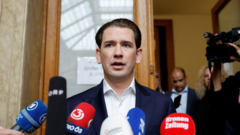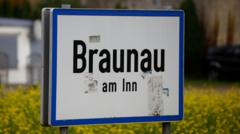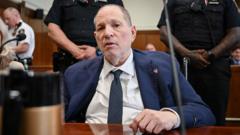Sebastian Kurz, Austria's ex-chancellor, has won a legal battle against a perjury conviction, paving the way potentially for a political comeback amid ongoing corruption inquiries.
Sebastian Kurz's Legal Victory: A New Chapter or the Same Controversies?

Sebastian Kurz's Legal Victory: A New Chapter or the Same Controversies?
Former Chancellor's Acquittal Opens Doors to Political Re-entry While Corruption Investigations Loom
Former Austrian Chancellor Sebastian Kurz has successfully appealed his conviction for providing false testimony to a parliamentary committee, leading to the quashing of his previous eight-month suspended prison sentence. The ruling, handed down by an appellate court, contradicts last year's verdict which held Kurz guilty of perjury related to allegations of his active role in selecting executives for a state holding company while in power.
Kurz, once considered a rising star of the European conservative movement, resigned from his chancellorship in 2021 amid a wave of allegations. His recent acquittal not only clears a significant legal hurdle but also raises questions about his potential return to the political arena, though he continues to face separate corruption investigations.
In 2020, Kurz had informed a parliamentary inquiry that he was "involved in the sense of informed," a claim that a lower court found misleading, asserting he was more engaged in the selection process than he admitted. However, Kurz's legal team challenged the initial trial's fairness, arguing prosecutorial bias, a claim which the appeal court upheld.
Outside the court, Kurz expressed relief at the ruling, proclaiming that the multitude of accusations against him have now "collapsed." Yet, he has not publicly indicated a desire to return to politics, despite his acquittal. Prosecutors are still weighing decisions regarding charges related to his alleged misappropriation of public funds for favorable media treatment and misleading polls.
Since stepping down in 2021, Kurz has shifted gears into the business world, co-founding a cybersecurity firm dubbed Dream in 2023, alongside prominent figures in the tech sphere, including a former head of the Israeli NSO firm, known for its controversial spyware.
The Austrian People's Party, which Kurz previously led to electoral victories in 2017 and 2019 with a tough immigration policy, remains influential, currently in a coalition government alongside the Social Democrats and a liberal party. Despite these political shifts, the far-right Freedom Party recently made significant gains in the last parliamentary elections, highlighting ongoing voter discontent rooted in economic and migration issues.
Kurz, once considered a rising star of the European conservative movement, resigned from his chancellorship in 2021 amid a wave of allegations. His recent acquittal not only clears a significant legal hurdle but also raises questions about his potential return to the political arena, though he continues to face separate corruption investigations.
In 2020, Kurz had informed a parliamentary inquiry that he was "involved in the sense of informed," a claim that a lower court found misleading, asserting he was more engaged in the selection process than he admitted. However, Kurz's legal team challenged the initial trial's fairness, arguing prosecutorial bias, a claim which the appeal court upheld.
Outside the court, Kurz expressed relief at the ruling, proclaiming that the multitude of accusations against him have now "collapsed." Yet, he has not publicly indicated a desire to return to politics, despite his acquittal. Prosecutors are still weighing decisions regarding charges related to his alleged misappropriation of public funds for favorable media treatment and misleading polls.
Since stepping down in 2021, Kurz has shifted gears into the business world, co-founding a cybersecurity firm dubbed Dream in 2023, alongside prominent figures in the tech sphere, including a former head of the Israeli NSO firm, known for its controversial spyware.
The Austrian People's Party, which Kurz previously led to electoral victories in 2017 and 2019 with a tough immigration policy, remains influential, currently in a coalition government alongside the Social Democrats and a liberal party. Despite these political shifts, the far-right Freedom Party recently made significant gains in the last parliamentary elections, highlighting ongoing voter discontent rooted in economic and migration issues.




















